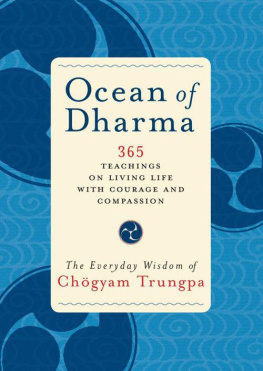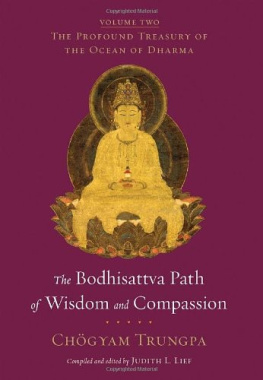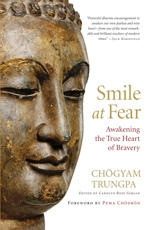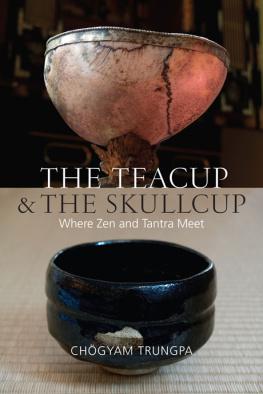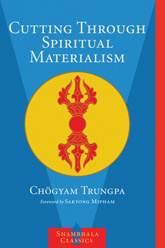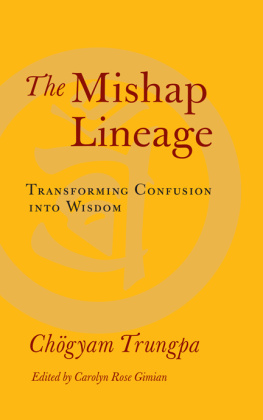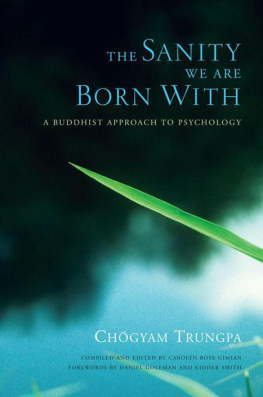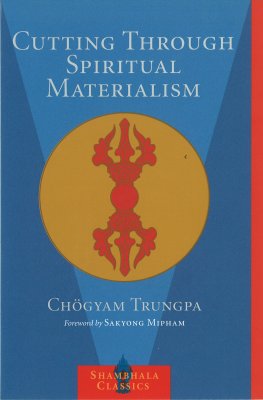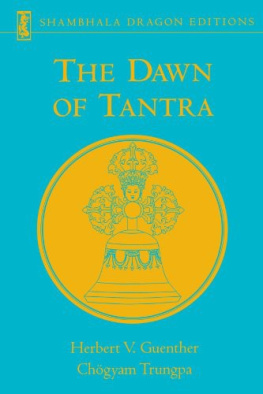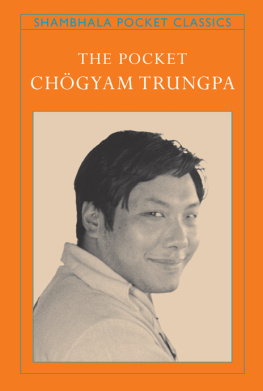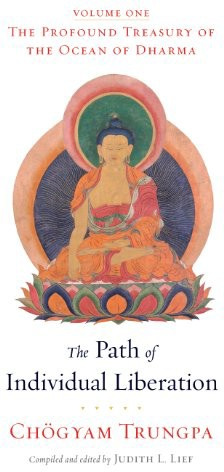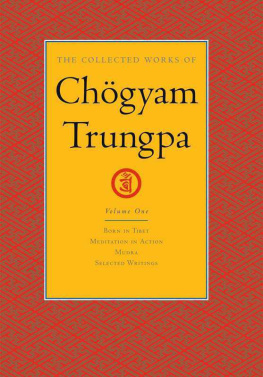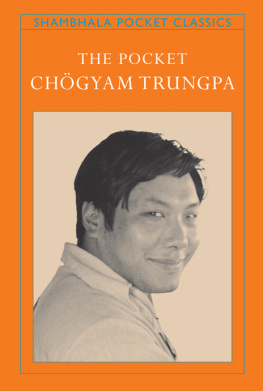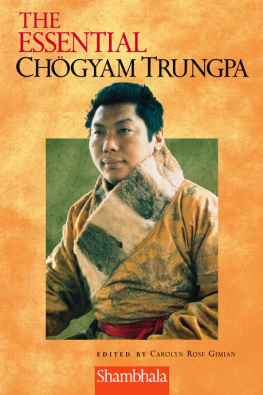OCEAN OF DHARMA
The Everyday Wisdom of Chgyam Trungpa

Compiled and Edited by
Carolyn Rose Gimian

Shambhala
Boston & London 2010
SHAMBHALA PUBLICATIONS, INC.
Horticultural Hall
300 Massachusetts Avenue
Boston, Massachusetts 02115
www.shambhala.com
2008 by Diana J. Mukpo
All rights reserved. No part of this book may be reproduced in any form or by any means, electronic or mechanical, including photocopying, recording, or by any information storage and retrieval system, without permission in writing from the publisher.
Library of Congress Cataloging-in-Publication Data
Trungpa, Chgyam, 19391987.
Ocean of dharma: the everyday wisdom of Chgyam Trungpa / Chgyam Trungpa; edited by Carolyn Rose Gimian.
p. cm.
Includes bibliographical references.
eISBN 978-0-8348-2142-2
ISBN 978-1-59030-536-2
1. Buddhist meditations. I. Gimian, Carolyn Rose. II. Title.
BQ5572. T78 2008
294.34432dc22
2007033814
CONTENTS
EDITORS PREFACE
T HIS BOOK CONTAINS 365 quotations from the teachings of Chgyam Trungpa Rinpoche, one of the most influential Buddhist teachers of our time. Ocean of Dharma is the literal translation of Chgyam, and it aptly describes the profound and vast nature of the teachings he offered during the more than twenty years he spent teaching in the West. (Rinpoche is a title for realized teachers in the Tibetan tradition, which means Precious One or Precious Jewel.)
There are many ways to read this book: You can open it to any page and see what you find. You can read a quote every morning or every night, or before or after your daily practice of meditation (or other contemplative disciplines). These quotes may stimulate your intellect and intuition, logical thought and feelings. They may confound. They may provide moments of Aha! How you engage this material is personal, and each readers experience will be different. These quotations not only present ultimate wisdom but relative, immediate truth, the means to realize this wisdom, and advice on how to apply your understanding in everyday life.
Chgyam Trungpa wrote that wisdom can only be taught in the form of a hint. Because of your own inherent wisdom, having received that hint, you can pick up the message spontaneously. Ocean of Dharma presents you with many hints about how to be and how to see: how to be a warrior without anger in this world, living with both tenderness and bravery; how to wake up and experience the brilliance and majesty of life; and how to share that with others. All of this is based on the courage to be realistic and genuine, and there are many quotes here that encourage the fearless acceptance of life as it is.
There are a number of approaches to contemplating what you read. You may deliberately reflect on a quote, probing it, looking at it from every angle. Or you may savor it, like slowly dissolving a piece of chocolate in your mouth, tasting every nuance of its sweet and bitter flavor. Or you may read a quote and then forget about it, not trying to do anything deliberate with it at all. Later, it may arise spontaneously in your mind. Sometimes wisdom hits you full in the face, like turning on the light in a dark room and being shocked by what you encounter. Sometimes it works its way into your heart and mind, only emerging after a long period of gestation.
Chgyam Trungpa described wisdom as a mirror, one which helps you to join heaven and earth. In this analogy, heaven is electricity or daylight; earth is your uncombed hair, your face, your unshaven beard. The mirror allows you to bring the two together so that you can see yourself, comb your hair, wash your face, and shave. In that sense, wisdom is both illuminating and practicalit lets you perceive yourself and your world and it provides a means to do something about what you see.
On the one hand, wisdom knows no master. It does not belong to anyone. On the other hand, its unique articulation is often what allows us to recognize it. Ocean of Dharma presents wisdom as viewed and expressed by a grand master of Buddhism in America. Twenty years after his death, he is still one of the best-selling Buddhist authors in the West. Why so? Because his teachings are so penetrating and so applicable to contemporary experience, yet they are also timeless. All of those qualities are manifest in these short quotations, as much as in the whole works from which they are drawn. There is something so unusual, uncanny, and personal about this man, and by reading his work, one is entering into a relationship with him, in a sense. I would be amazed if you could read this book from beginning to end without being deeply affected.
Many quotes deal with experiences that are inspired by or arise from the practice of sitting meditation. Yet it is not necessary to be a meditator in order to appreciate and benefit from this book. In one of the selections, Chgyam Trungpa says that anyone who creates a work of art meditates, whether they call the activity meditation or not. Wherever one finds a gap or a sense of space in life, whatever it is that one does that provides a feeling of ground, earth, or beingfundamentally, that is meditation. With that in mind, anyone could connect with the material in this book.
For those curious about meditation but untutored in the technique, an introduction to the practice of meditation appears in the back matter, adapted from Shambhala: The Sacred Path of the Warrior . Anyone who wants to practice meditation would be well-advised to get personal instruction. Purely learning to meditate from a book is like learning to cook from a cookbook without ever having been in the kitchen before.
This book evolved from an e-mail service I developed called Ocean of Dharma Quotes of the Week..) While most of the quotations in this collection are from published sources (both well-known and obscure), some material appears in print here for the first time. My sources include unpublished transcripts, sourcebooks that are not in wide distribution, as well as classic, best-selling works. The source of each quotation is identified at the end of the book.
Many times while I was working on this manuscript, I found that the quotations and my life intersected in unexpected ways. For example, one afternoon I was having an argument with my husband. We parted in a huff and I went back to working on the book. To my surprise, the next quote I read was one on marriage and regarding communication with your partner as sacred. Many people who subscribe to Ocean of Dharma have reported similar experiences. The quote arrives in the e-mail just when they are working with the particular issue it addresses. This unplanned but often reported synchronicity is one of the reasons that I came to believe that a book based on the quotes would be helpful.
I have reworked, reordered, and retitled a great deal of material. I edited the selections from unedited and unpublished talks and seminars, and in a few instances I have reedited passages from published sources, almost always those originally edited by myself. Questions and answers have been edited into expository statements. I have also condensed quotations, inserted definitions of Buddhist terms, and in a few places I have made gender or voice changes or added a phrase for clarification. All of this has been done in the interest of making this material as immediate and accessible as possible in this context.
Like an ocean, like a hint, like a mirror, wisdom is vast, ineffable, and luminous. So too is the mind of the wisdom holder Chgyam Trungpa Rinpoche. Rinpoche liked to tell stories about Padmasambhava, the father of Buddhism in Tibet. According to tradition, Padmasambhava wrote down a number of teachings and buried them in the mountains of Tibet so that they would be discovered by future generations. Reflecting on this practice, Trungpa Rinpoche wrote:
Next page
